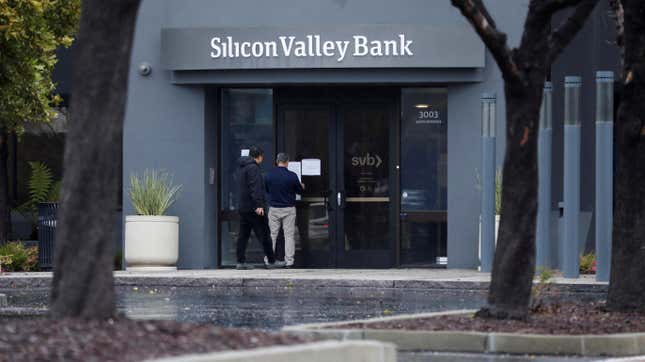
With a resoluteness befitting a response to the threat of an all-out banking crisis, US banking regulators issued a joint statement on the evening of March 12, declaring that all depositors in the failed Silicon Valley Bank (SVB) will have full access to their funds starting March 13.
The US Treasury Department, Federal Reserve, and Federal Deposit Insurance Corp. (FDIC) also announced they were making a “similar systemic risk exception” for customers of Signature Bank, a bank known for serving crypto industry clients, which was shut down earlier in the day by state regulators in New York.
Until this weekend, the US government had not treated either bank as systemically important. Neither appears on the global list of systemically important banks (pdf) maintained by the international Financial Standards Board. And neither was included on the Fed’s most recent list of US banks deemed large enough to undergo required stress testing.
The ability of these banks to fly under the radar in the US was no accident. Greg Becker, SVB’s CEO, lobbied US officials several years ago to raise the asset threshold at which banks would be considered systemically important.
The threshold was raised in 2018 from $50 billion to $250 billion of assets in 2018. SVB had just crossed the $50 billion mark when Becker pushed for the change; when it collapsed last week, it had $209 billion of assets, making it the second-largest US bank failure ever.
A new emergency lending program
If SVB and Signature weren’t important, systemically speaking, as going concerns, in failure they clearly presented more risk to the financial system than the US government was comfortable with. In addition to protecting uninsured deposits at SVB and Signature, the Treasury Department, Fed, and FDIC announced the creation of an emergency lending program to ensure “banks have the ability to meet the needs of all their depositors.” The program will accept bonds and other securities as collateral, and will value them at par rather than current market prices.
Rising interest rates have lowered prices for bonds, which contributed to the squeeze at SVB—a fire sale of the bank’s bond portfolio created losses, triggering a sudden outflow of deposits in a classic run on the bank.
Whether any of this tempers the Fed’s recent insistence on continued rate hikes remains to be seen.
Which US banks are stress tested by the Fed?
The actions taken by the US government to backstop the banking system suggest SVB, which has a tech- and startup-heavy client list, and Signature, popular in recent years for its willingness to work with cryptocurrency businesses, were far bigger systemic risks than regulators had acknowledged.
As a result of the increased asset thresholds adopted during the Trump administration, SVB and Signature, which had $110 billion in assets when it failed, were not among the 33 US institutions (pdf, p.13) that participated in recent stress tests required by the Fed to gauge how large banks would fare in a hypothetical recession.
These are the banks, listed alphabetically, that took part in the stress tests in 2022; all of them passed.
- Ally Financial
- American Express
- Bank of America
- Bank of New York Mellon
- Barclays US
- BMO Financial
- BNP Paribas USA
- Capital One Financial
- Charles Schwab
- Citigroup I
- Citizens Financial
- Credit Suisse Holdings (USA)
- DB USA
- Discover Financial Services
- Fifth Third Bancorp
- Goldman Sachs Group
- HSBC North America Holdings
- Huntington Bancshares
- JPMorgan Chase
- KeyCorp Category
- M&T Bank Corporation
- Morgan Stanley
- Northern Trust
- PNC Financial Services Group
- RBC US Group Holdings
- Regions Financial
- Santander Holdings USA
- State Street
- TD Group US Holdings
- Truist Financial
- UBS Americas Holding
- US Bancorp
- Wells Fargo